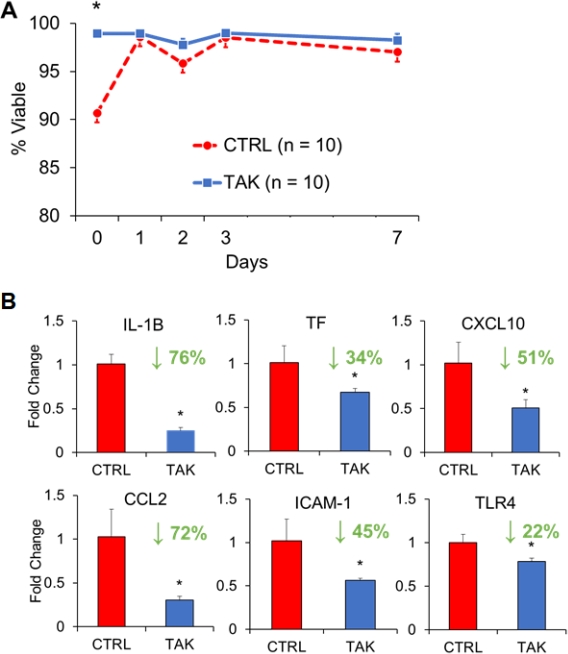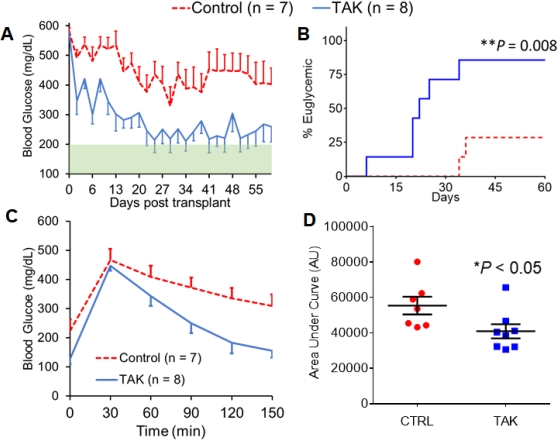Early Blockade of Toll-Like Receptor 4 Reduces Ischemia-Reperfusion Injury and Improves Islet Transplantation Outcomes
1Institute of Biomedical Studies, Baylor University, Waco
2Baylor Scott & White Research Institute, Dallas
3Baylor Simmons Transplant Institute, Dallas.
Meeting: 2018 American Transplant Congress
Abstract number: 13
Keywords: Inflammation, Ischemia, Islets, Procurement
Session Information
Session Name: Concurrent Session: Islet Cell and Cell Transplantation
Session Type: Concurrent Session
Date: Sunday, June 3, 2018
Session Time: 2:30pm-4:00pm
 Presentation Time: 2:42pm-2:54pm
Presentation Time: 2:42pm-2:54pm
Location: Room 2AB
Purpose: Inflammatory damage to islets during isolation is a major hurdle for success in transplantation. We investigated the safety and therapeutic potential of pharmacological blockade of Toll-like Receptor 4 (TLR4) during organ procurement on transplant outcomes.
Methods: Islets were isolated from C57BL/6 pancreata with collagenase alone (CTRL) or in combination with TAK242, a clinically tested TLR4 antagonist (TAK). Isolated islets are assayed for viability on days 0-3 and 7 by Hoechst/PI staining, and for functionality by glucose-stimulated insulin secretion on days 1, 2, and 3. RT-PCR was used to analyze gene expression of inflammatory mediators post-isolation. STZ-induced diabetic mice received either 150 CTRL or TAK islets intraportally. The mice were followed by measuring blood glucose and body weight for 60 days, with an intraperitoneal glucose tolerance test (IPGTT) performed on day 45. Serum was collected on days 0-3 for cytokine and MiR375 analysis, and grafts recovered for histology.
Results:  TAK islets demonstrated significantly improved viability on day 0 compared to CTRL islets (Fig 1A). TAK islets also had preserved islet function as assessed by GSIS. Gene analysis showed TAK islets has significant reductions in IL-1β, Tissue Factor, CXCL10, CCL2, ICAM-1, and TLR4 (Fig 1B).
TAK islets demonstrated significantly improved viability on day 0 compared to CTRL islets (Fig 1A). TAK islets also had preserved islet function as assessed by GSIS. Gene analysis showed TAK islets has significant reductions in IL-1β, Tissue Factor, CXCL10, CCL2, ICAM-1, and TLR4 (Fig 1B).  75% of mice receiving TAK islets achieved euglycemia compared to only 28.5% of mice receiving CTRL islets (Figs 2A & B), and had enhanced weight gain (P < 0.0001). IPGTT area-under-curve analysis demonstrated superior response by mice receiving TAK islets (Figs 2C & D).
75% of mice receiving TAK islets achieved euglycemia compared to only 28.5% of mice receiving CTRL islets (Figs 2A & B), and had enhanced weight gain (P < 0.0001). IPGTT area-under-curve analysis demonstrated superior response by mice receiving TAK islets (Figs 2C & D).
Conclusion: Early blockade of TLR4 is non-toxic to islets, reduces ischemia-reperfusion injury, and improves transplant outcomes.
CITATION INFORMATION: Chang C., Lawrence M., Kane R., Naziruddin B. Early Blockade of Toll-Like Receptor 4 Reduces Ischemia-Reperfusion Injury and Improves Islet Transplantation Outcomes Am J Transplant. 2017;17 (suppl 3).
To cite this abstract in AMA style:
Chang C, Lawrence M, Kane R, Naziruddin B. Early Blockade of Toll-Like Receptor 4 Reduces Ischemia-Reperfusion Injury and Improves Islet Transplantation Outcomes [abstract]. https://atcmeetingabstracts.com/abstract/early-blockade-of-toll-like-receptor-4-reduces-ischemia-reperfusion-injury-and-improves-islet-transplantation-outcomes/. Accessed February 15, 2026.« Back to 2018 American Transplant Congress
